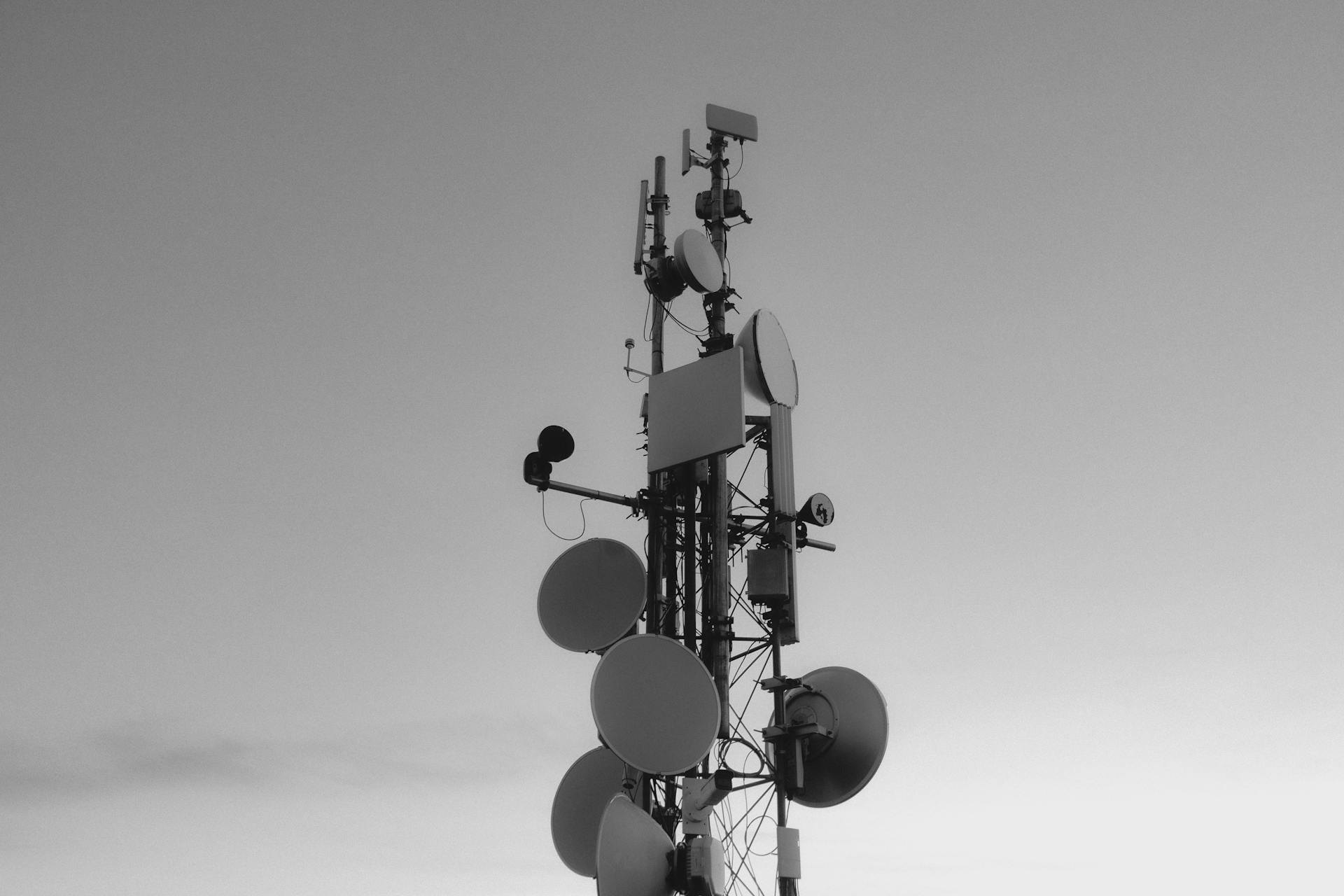
In healthcare, effective communication is crucial for patient care and satisfaction. HIPAA compliant communication is a must to protect sensitive patient information.
To ensure HIPAA compliance, healthcare providers must use secure communication channels, such as encrypted email or secure messaging apps. These channels are designed to safeguard patient data from unauthorized access.
Healthcare providers should also be mindful of patient confidentiality, using secure phone lines or video conferencing tools with end-to-end encryption. This helps prevent eavesdropping or interception of sensitive information.
HIPAA compliant communication also requires providers to keep accurate records of patient interactions, including phone calls, emails, and in-person visits. This helps ensure accountability and facilitates audits if needed.
What is HIPAA Compliant Communication
HIPAA compliant communication is all about using the right technology and policies to protect sensitive information. It's not just about healthcare companies, but also financial and other organizations that handle Protected Health Information (PHI).
To maintain compliance, messaging applications need to track regulatory developments and monitor compliance with HIPAA law. This includes staying up-to-date with changes to the law.
Using the right technology can help companies use SMS for tasks like appointment confirmations and prescription reminders. This can improve customer experiences and increase engagement.
Healthcare providers need to have enhanced audit and reporting tools to remain compliant. These tools help them act quickly in case of any issues.
Companies can still use text messaging for various purposes while maintaining HIPAA compliance. This includes appointment confirmations, prescription reminders, follow-up conversations, and more.
Benefits of HIPAA Compliant Communication
HIPAA compliant communication offers numerous benefits, including improved patient confidentiality through strict security measures. This is crucial in protecting sensitive patient information.
Data is secure with HIPAA compliant texting solutions, ensuring that shared data meets protocols and is transmitted and stored securely. This provides peace of mind for healthcare providers.
HIPAA compliant messaging integrates with practice management systems, providing a seamless and secure flow of information to and from the system. This allows healthcare providers to access all patient data in one platform.
Automating appointment reminders, confirmations, and payment messages through a HIPAA-compliant texting service increases operational efficiency. This frees up staff to focus on patient care and satisfaction.
Two-way messaging guarantees timely responses from patients, as they prefer text messages over phone calls. This improves patient engagement and reduces call volumes.
Secure messaging allows healthcare providers to maximize patient access by sending practice updates, pre and post-op instructions, and other types of communication. This helps reduce call volumes and keeps patients informed.
HIPAA compliant messaging enables healthcare providers to keep patients informed about their well-being and treatment options, leading to better health outcomes.
HIPAA Compliant Communication Best Practices
Use a HIPAA Compliant Texting Service to ensure secure communication with patients. This means investing in a specialist service that can encrypt conversations in transit and at rest, offer access to text message archiving capabilities, and restrict access to data.
Texts sent from a personal phone without specialist software aren’t HIPAA compliant. This is a critical step in maintaining confidentiality of patient information.
Use encrypted communication channels, such as end-to-end encryption services, when sending information via email to potential clients. This ensures secure communication.
One of the best ways to maintain HIPAA compliant texting practices is to reduce the amount of PHI you reveal in messages. Avoid including any specific information about a patient’s conditions, billing information, or their treatment in messages when possible.
Restrict PHI in text messages to generic or vague messages, such as appointment confirmation texts that don’t include personal data. This is usually safer from a HIPAA compliance perspective.
HIPAA compliance is an ongoing effort, so invest in HIPAA secure app training to educate users about appropriate protocols. This includes training on how to handle sensitive PHI.
Use a healthcare or insurance text message template that positions personal data closer to the bottom of the text to avoid sensitive information showing in a “preview” on a patient’s phone.
HIPAA Compliant Communication Tools
Maintaining HIPAA compliance with text messaging can be complicated, but it's not impossible. With a combination of the right technology and HIPAA text messaging policies, companies can still use SMS for various purposes while protecting Protected Health Information (PHI).
You can ensure HIPAA compliance with text messaging by evaluating security features and functionality in the app, integrating it with your Electronic Health Record (EHR) or other systems, and considering ease of use and cost.
Choosing the right HIPAA compliant text messaging app requires an understanding of your healthcare business. Some important factors to consider include evaluating security features and functionality, integration with other systems, ease of use, and cost.
The risks of non-compliance are very real, with 53% of Protected Health Information (PHI) breaches attributed to internal staff of healthcare entities. To prevent these breaches, it's essential to find a communication solution that is already HIPAA compliant.
Some of the top HIPAA compliant text messaging solutions include NexHealth, Twilio, TigerConnect, Vonage, MessageMedia, and MessageDesk. These solutions offer features such as appointment management, video telehealth services, reminders, and secure messaging.
When choosing a HIPAA compliant communication channel, consider integrating auditing capabilities to provide evidence of systems and processes that record and examine how PHI is shared and stored. This can help you demonstrate compliance with HIPAA regulations.
You can also consider integrating your HIPAA compliant text messaging app with Electronic Health Records (EHR) systems to have a comprehensive view of patient data. Additionally, integrating with Artificial Intelligence (AI) can provide proactive care by analyzing communication patterns to predict patient needs and outcomes.
Here are some of the top HIPAA compliant text messaging apps, along with their features and pricing:
By choosing the right HIPAA compliant communication tools, you can ensure secure and compliant communication with patients and other healthcare providers.
HIPAA Compliant Communication Security
To maintain HIPAA compliant communication, you need to ensure that patient data is protected at every stage. This includes encrypting messages in transit and at rest, as well as implementing secure access controls.
Two-factor authentication is a crucial aspect of HIPAA compliant communication security. This adds an extra layer of security, making it harder for unauthorized personnel to access sensitive information.
Strong password policies and role-based access control are also essential in ensuring that only authorized personnel have access to patient data.
Secure messaging and encryption are critical components of HIPAA compliant communication. This includes using end-to-end encryption, access controls, and message audit logs to minimize the risk of data breaches.
It's also essential to restrict PHI in text messages and use a HIPAA compliant texting service that can encrypt conversations in transit and at rest.
Here are some key features to look for in a HIPAA compliant communication solution:
- End-to-end encryption
- Access controls
- Message audit logs
- Two-factor authentication
- Strong password policies
- Role-based access control
By implementing these security measures, you can ensure that your communication is HIPAA compliant and patient data is protected.
HIPAA Compliant Communication Features
HIPAA compliant text messaging apps prioritize secure communication of sensitive health information (PHI), ensuring that healthcare providers can share patient data while maintaining confidentiality.
To maintain compliance, messaging applications must proactively track regulatory developments and monitor compliance with HIPAA law, as well as other applicable privacy regulations such as the GDPR and state regulations.
A HIPAA-compliant messaging solution automatically audits and logs all administrator activities related to users, policies, authentication, and reading receipts of messages.
Here are some key features of HIPAA compliant text messaging apps:
- Secure communication of PHI
- Optimization of healthcare workflows
- Integration with electronic health records (EHR) systems
- HL7 integration for seamless data sharing
- Integration with artificial intelligence (AI) for proactive care
By incorporating these features, healthcare providers can ensure secure and compliant communication with patients, while also streamlining workflows and improving patient outcomes.
Integrate Auditing Capabilities
To maintain HIPAA compliance, it's essential to integrate auditing capabilities into your messaging solution. This will help you track and record all administrator activities related to users, policies, authentication, and reading receipts of messages.
Having a HIPAA-compliant messaging solution automatically audits and logs all administrator activities is crucial for maintaining compliance. This ensures that you have a clear audit trail in case of a security breach or HIPAA audit.
The app keeps track of all user activity – who sent what to whom, when the data was accessed – so there’s an audit trail for HIPAA compliance texting as well as forensics in case of a security breach.
To ensure you're meeting the necessary requirements, look for a messaging solution that includes features like:
By integrating auditing capabilities into your messaging solution, you can ensure that you're meeting the necessary requirements for HIPAA compliance and maintaining a secure communication environment.
AI Integration
AI integration is a crucial aspect of HIPAA compliant communication features. It enables healthcare providers to leverage advanced technologies like AI, ML, and chatbots to streamline workflows and improve patient care.
Folio3 has experience in the healthcare industry, which is critical for understanding the specific needs and regulations associated with healthcare communication. This expertise allows them to develop solutions that ensure data privacy and security.
AI support driven by AI includes chatbots and virtual assistants that offer immediate help, answer common patient questions, and screen cases before they are referred to a human clinician. These tools can be integrated with electronic health records (EHR) systems to provide a comprehensive view of patient data.
AI can analyze communication patterns to predict patient needs and outcomes, enabling proactive care. This proactive approach can lead to better patient outcomes and improved healthcare delivery.
To integrate AI effectively, healthcare providers should consider the following:
- Domain knowledge: Understanding the specific needs and regulations associated with healthcare communication.
- HIPAA compliance texting: Ensuring data privacy and security through HIPAA compliant solutions.
- Technology stack: Leveraging modern technologies like cloud computing, AI, and ML to create advanced features in messaging apps.
HIPAA Compliant Communication Considerations
Maintaining HIPAA compliance with text messaging can be complicated, but it's not impossible. Companies can use SMS for appointment confirmations, prescription reminders, and follow-up conversations, while still staying compliant.
To maintain compliance, messaging applications must proactively track regulatory developments and monitor compliance with HIPAA law and other applicable privacy regulations. This includes the GDPR and state regulations as they develop.
Healthcare organizations and professionals must ensure that they use communications systems that are secure and HIPAA compliant when storing, transmitting, or receiving protected health information. This is crucial for effective communication in healthcare settings.
Existing secure messaging solutions, such as Apple's iMessage, may not be HIPAA compliant, even with robust security features. A service must meet specific requirements, including the ability to perform audits and have business associate agreements (BAAs) in place.
Some requirements for HIPAA-compliant messaging include:
- Audit capabilities to ensure compliance
- Business associate agreements (BAAs) to protect PHI
Organizations looking for customer service tools, such as chatbots, should seek out HIPAA-compliant solutions to protect sensitive communications. This is especially important when transmitting or receiving protected healthcare information.
HIPAA Compliant Communication Implementation
Implementing HIPAA compliant communication requires a thoughtful approach. You can start by ensuring your messaging system has the right technology in place.
To maintain HIPAA compliant texting practices, businesses need to implement clear safeguards to reduce access to PHI and sensitive information. This includes using two-factor authentication (2FA) to prevent unauthorized access.
Access controls are crucial to secure HIPAA texting practices. Businesses should implement strategies that govern what different employees can do with their messaging system, such as limiting who can customize SMS templates or share sensitive data.
Offering extensive employee training can also be useful in ensuring each team member understands the risks involved with SMS, and how they can contribute to HIPAA compliant texting.
To maintain compliance, messaging applications will be required to comply with and proactively track regulatory developments. This includes tracking HIPAA law and potentially other applicable privacy regulations, such as the GDPR and state regulations.
You'll also need to implement enhanced audit and reporting tools to help healthcare providers remain compliant and act quickly in case of non-compliance.
HIPAA Compliant Communication Future
The future of HIPAA compliant communication is looking bright, and it's all thanks to the expanding use of technology in the healthcare industry. Regulatory bodies are taking a closer look at how healthcare providers communicate with patients, and it's up to us to stay ahead of the curve.
Companies investing in insurance text messaging need to put extra precautions in place to maintain HIPAA compliance. This means taking extra steps to defend Protected Health Information (PHI).
With the right technology and policies in place, healthcare groups can still use SMS for various purposes, such as appointment confirmations, prescription reminders, and follow-up conversations. This opens the door to improved customer experiences and a better return on investment for marketing campaigns.
Here are some key trends and developments shaping the future of HIPAA compliant text messaging apps:
- Messaging applications will be required to comply with and proactively track regulatory developments and monitor compliance with HIPAA law.
- The need for enhanced audit and reporting tools will help healthcare providers remain compliant and act quickly in case of non-compliance.
- Regulators will be scrutinizing healthcare practices more closely, so it's essential to stay on top of compliance.
The future of HIPAA compliant text messaging apps will depend on the expanded use of technology, changing healthcare practices, and heightened scrutiny by healthcare regulators. By staying informed and adapting to these changes, we can ensure that our communication practices remain compliant and effective.
HIPAA Compliant Communication Compliance
Maintaining HIPAA compliance with text messaging requires some extra precautions, but it's not impossible. Companies need to put the right technology and policies in place to defend Protected Health Information (PHI).
To ensure HIPAA compliance with text messaging, healthcare groups can use SMS for appointment confirmations, prescription reminders, follow-up conversations, and more. This can improve customer experiences and increase engagement.
Maintaining compliance requires messaging applications to track regulatory developments and proactively comply with HIPAA law and other applicable privacy regulations. Enhanced audit and reporting tools will help healthcare providers remain compliant and act quickly in case of non-compliance.
Here are the key requirements for HIPAA compliant communication:
- Messaging applications must comply with and track regulatory developments.
- Enhanced audit and reporting tools are necessary for compliance.
Is HIPAA Compliant Communication Necessary
Maintaining compliance with HIPAA law is crucial for messaging applications.
To stay compliant, messaging applications must track regulatory developments and comply with HIPAA law, as well as potentially other applicable privacy laws like the GDPR and state regulations.
Healthcare providers need enhanced audit and reporting tools to remain compliant and act quickly in cases where non-compliance is discovered.
These tools help healthcare providers meet the requirements for proactive tracking and monitoring of compliance.
The need for enhanced audit and reporting tools is driven by the need for healthcare providers to remain compliant and act quickly in cases of non-compliance.
Regulatory Compliance
Maintaining HIPAA compliance with text messaging requires a combination of the right technology and policies to defend Protected Health Information (PHI).
To stay compliant, messaging applications must proactively track regulatory developments, such as HIPAA law, the GDPR, and state regulations as they evolve.
Healthcare providers need enhanced audit and reporting tools to quickly act in case of a compliance issue.
Violating HIPAA regulations can result in significant penalties, ranging from $100 to $50,000 per day, depending on the severity of the infraction.
The potential outcomes of a HIPAA violation include internal handling, staff termination, professional board sanctions, and even criminal charges with fines and imprisonment.
Here's a breakdown of the potential civil and criminal penalties for HIPAA violations:
Frequently Asked Questions
How to send a HIPAA compliant text?
To send a HIPAA compliant text, choose a provider that signs a Business Associate Agreement (BAA) and ensures messages are encrypted both in transit and at rest, using secure devices and two-factor authentication. This ensures patient confidentiality and meets HIPAA's strict security standards.
What are the HIPAA rules for talking about patients?
Under HIPAA rules, you can discuss a patient without revealing their name, but avoid sharing any identifiable information. This ensures patient confidentiality and protects their personal health data
Featured Images: pexels.com


